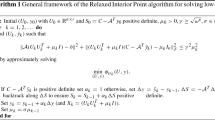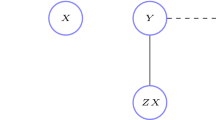Abstract
A basic framework for exploiting sparsity via positive semidefinite matrix completion is presented for an optimization problem with linear and nonlinear matrix inequalities. The sparsity, characterized with a chordal graph structure, can be detected in the variable matrix or in a linear or nonlinear matrix-inequality constraint of the problem. We classify the sparsity in two types, the domain-space sparsity (d-space sparsity) for the symmetric matrix variable in the objective and/or constraint functions of the problem, which is required to be positive semidefinite, and the range-space sparsity (r-space sparsity) for a linear or nonlinear matrix-inequality constraint of the problem. Four conversion methods are proposed in this framework: two for exploiting the d-space sparsity and the other two for exploiting the r-space sparsity. When applied to a polynomial semidefinite program (SDP), these conversion methods enhance the structured sparsity of the problem called the correlative sparsity. As a result, the resulting polynomial SDP can be solved more effectively by applying the sparse SDP relaxation. Preliminary numerical results on the conversion methods indicate their potential for improving the efficiency of solving various problems.
Similar content being viewed by others
References
Agler J., Helton J.W., McCullough S., Rodman L.: Positive semidefinite matrices with a given sparsity pattern. Linear Algebra Appl. 107, 101–149 (1988)
Ashcraft C., Pierce D., Wah D.K., Wu J.: The Reference Manual for SPOOLES, Release 2.3: An Object Oriented Software Library for Solving Linear Systems of Equations. Boeing Shared Services Group, Seattle, WA (1999)
Blair J.R.S., Peyton B.: An introduction to chordal graphs and clique trees. In: George, A., Gilbert, J.R., Liu, J.W.H. (eds) Graph Theory and Sparse Matrix Computation, pp. 1–29. Springer, New York (1993)
Biswas, P., Ye, Y.: Semidefinite programming for ad hoc wireless sensor network localization. In: Proceedings of the Third International Symposium on Information Processing in Sensor Networks, pp. 46–54. ACM press (2004)
Borchers B.: SDPLIB 1.2, A library of semidefinite programming test problems. Optim. Methods Softw. 11–12, 689 (1999)
Fukuda M., Kojima M., Murota K., Nakata K.: Exploiting sparsity in semidefinite programming via matrix completion I: General framework. SIAM J. Optim. 11, 647–674 (2000)
Grone R., Johnson C.R., Sá E.M., Wolkowitz H.: Positive definite completions of a partial hermitian matrices. Linear Algebra Appl. 58, 109–124 (1984)
Henrion D., Lasserre J.B.: Convergent relaxations of polynomial matrix inequalities and static output feedback. IEEE Trans. Autom. Control 51, 192–202 (2006)
Hol, C.W.J., Scherer, C.W.: Sum of squares relaxations for polynomial semidefinite programming. In: Proc. Symp. on Mathematical Theory of Networks and Systems (MTNS). Leuven, Belgium (2004)
Karypis, G., Kumar, V.: METIS—A Software Package for Partitioning Unstructured Graphs, Partitioning Meshes, and Computing Fill-Reducing Ordering of Sparse Matrices, version 4.0–, Department of Computer Science/Army HPC Research Center, University of Minnesota, Minneapolis, MN, September (1998)
Kim S., Kojima M., Waki H.: Exploiting sparsity in SDP relaxation for sensor network localization. SIAM J. Optim. 20(1), 192–215 (2009)
Kim, S., Kojima, M., Waki, H., Yamashita, M.: SFSDP: a Sparse Version of Full Semidefinite Programming Relaxation for Sensor Network Localization Problems. Research Report B-457, Dept. of Mathematical and Computing Sciences, Tokyo Institute of Technology, Meguro, Tokyo, pp. 152–8552 (2009)
Kobayashi K., Kim S., Kojima M.: Correlative sparsity in primal-dual interior-point methods for LP, SDP and SOCP. Appl. Math. Optim. 58, 69–88 (2008)
Kojima, M.: Sums of Squares Relaxations of Polynomial Semidefinite Programs, Research Report B-397, Department of Mathematical and Computing Sciences, Tokyo Institute of Technology, Oh-Okayama, Meguro, Tokyo, pp. 152–8552, Japan, (November 2003)
Kojima M., Muramatsu M.: An extension of sums of squares relaxations to polynomial optimization problems over symmetric cones. Math. Program. 110, 315–336 (2007)
Kojima M., Muramatsu M.: A note on sparse SOS and SDP relaxations for polynomial optimization problems over symmetric cones. Comput. Optim. Appl. 42, 31–41 (2009)
Lasserre J.B.: Global optimization with polynomials and the problems of moments. SIAM J. Optim. 11, 796–817 (2001)
Lasserre J.B.: Convergent SDP-relaxations in polynomial optimization with sparsity. SIAM J. Optim. 17(3), 822–843 (2006)
Mevissen M., Kojima M., Nie J., Takayama N.: Solving partial differential equations via sparse SDP relaxations. Paci. J. Optim. 4(2), 213–241 (2008)
Nakata K., Fujisawa K., Fukuda M., Kojima M., Murota K.: Exploiting sparsity in semidefinite programming via matrix completion II: Implementation and numerical results. Math. Program. 95, 303–327 (2003)
Nesterov Ju E., Nemirovski A.S.: Interior Point Polynomial Methods in Convex Programming: Theory and Applications. SIAM, Philadelphia, PA (1994)
Strum J.F.: SeDuMi 1.02, a MATLAB toolbox for optimization over symmetric cones. Optim. Methods Softw. 11 & 12, 625–653 (1999)
Waki H., Kim S., Kojima M., Muramatsu M.: Sums of Squares and Semidefinite Programming Relaxations for Polynomial Optimization Problems with Structured Sparsity. SIAM J. Optim. 17, 218–242 (2006)
Waki H., Kim S., Kojima M., Muramatsu M., Sugimoto H.: SparsePOP : A Sparse Semidefinite Programming Relaxation of Polynomial Optimization Problems. ACM Trans. Math. Software 35(2), 15 (2008)
Author information
Authors and Affiliations
Corresponding author
Additional information
S. Kim’s research was supported by KRF 2008-531-C00013 and KRF 2009-007-1314. M. Kojima’s research was Grant-in-Aid for Scientific Research (B) 19310096. M. Mevissen’s research was supported by the Doctoral Scholarship of the German Academic Exchange Service (DAAD). M. Yamashita’s research was supported by Grant-in-Aid for Young Scientists (B) 18710141.
Rights and permissions
About this article
Cite this article
Kim, S., Kojima, M., Mevissen, M. et al. Exploiting sparsity in linear and nonlinear matrix inequalities via positive semidefinite matrix completion. Math. Program. 129, 33–68 (2011). https://doi.org/10.1007/s10107-010-0402-6
Received:
Accepted:
Published:
Issue Date:
DOI: https://doi.org/10.1007/s10107-010-0402-6
Keywords
- Semidefinite Program
- Matrix Inequalities
- Polynomial Optimization
- Positive Semidefinite Matrix Completion
- Sparsity
- Chordal Graph




